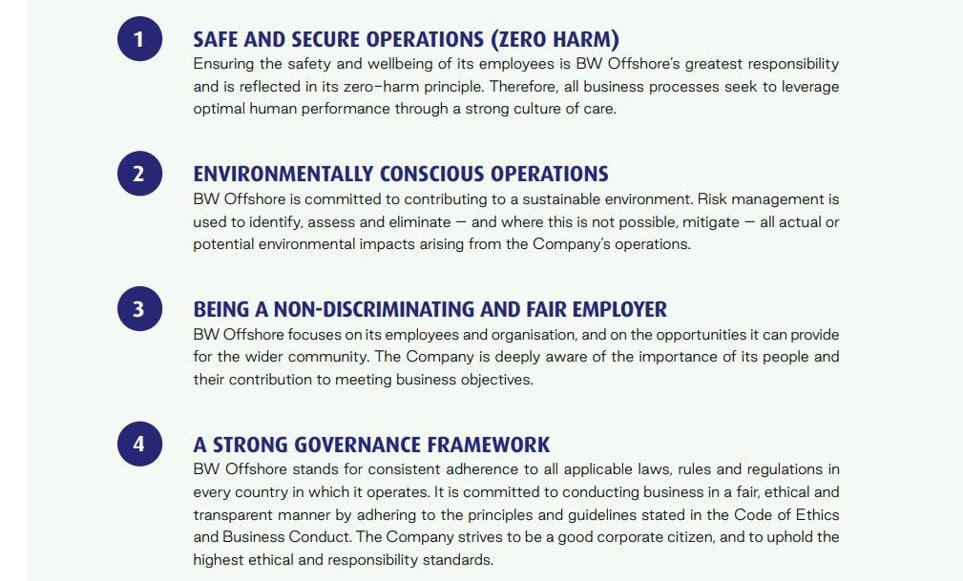Earth Day 2022 - “Invest in our planet”
In relation to Earth Day, we would like to take the opportunity to share information about BW Offshore’s overall commitment to environment related challenges. In this article, you can read about our initiatives to minimise emissions, eliminate single-use plastics within our operations, and how we consider investments into renewable energy sources.
The global energy market transition reflects both public environmental concerns and political commitments to reduce carbon emissions. The energy transition poses new risks from an operational, regulatory, reputational and market perspective. It also generates new opportunities for participation, by ensuring existing fossil fuel infrastructures are operated with a minimum carbon footprint, by engaging with transitional fuels (such as natural gas) and by evaluating alternative clean energy sources.
BW Offshore’s commitment to ESG
As an energy sector services provider, risks of environmental impacts caused by BW Offshore’s operations and activities are considered to be of material importance. As a company, we are committed to efficient, reliable and compliant operations, with zero harm to people, the environment and the communities in which we operate, and we have identified four major areas to highlight our commitment to ESG:

You can find more information about the different commitment areas and learn about all our corporate goals in our 2021 Annual Report.
Reducing environmental risk
We have four environment related corporate goals directly tied to reducing environmental risk. Our environmental impact is determined by assessing operational performance against key performance indicators. Senior Management reviews fleet-wide environmental performance on a quarterly basis. We integrate environmental management within the Management System to ensure environmental risks are appropriately identified, assessed, controlled and monitored.
Economically minimise Greenhouse Gas (GHG) emissions from offshore operations
BW Offshore is taking several steps to minimise GHG emissions. For example, the Barossa FPSO is designed to have minimum impact on the environment, and we have achieved a 15% reduction in GHG emissions generated by the Barossa FPSO’s heating and power system, compared with alternative legacy power generation configurations currently in use in the Australian offshore oil and gas sector.
We are also working to minimise emissions from our existing operations. Five-year plans have been established for the legacy FPSOs to enhance maintenance, targeting reduction of fugitive emissions sources and fluorinated gas leaks, and optimising combustion emission sources as far as practicable.

Eliminate single-use plastics within company operations
The company has introduced a fleet-wide plastic waste monitoring systems to identify further sources of single use plastics that may be eliminated to reach our overall goal. For example, Joko Tole only uses water fountains on the unit, not plastic bottled water. Petróleo Nautipa, BW Adolo, Espoir Ivoirien, Sendje Berge, FPSO ABO and BW Pioneer have also all mobilised drinking water fountains - although some units are facing issues implementing due to supply chain challenges on the 20 gallon drinking water drums.
In 2022, we plan to perform a detailed plastics waste audit on BW Catcher, including crew training by a specialist environmental organisation. We will also ensure that all Barossa project sites are free of single-use plastic bottled water in favour of reusable drinking banisters and water dispensers.
Eliminate the use of harmful chlorofluorocarbons (CFCs) and hydrochlorofluorocarbons (HCFCs) wherever practicable
In our operations, we utilise freon gases to charge HVAC, refrigeration and fire-suppression systems. There is a global regulatory regime, via the Montreal Protocol and its subsequent amendments, that implements the global phasing out of harmful freon gases, and BW Offshore strives to comply with international phase-out regulations. The Barossa FPSO is designed with freon systems that are CFC- and HCFC-free.
In 2021, we implemented a system for monitoring and reporting usage of freon gases on the legacy fleet. We also replaced the HVAC charging gas on BW Catcher with a product that has a reduced global warming potential. We will continue to enhance routine maintenance on freon gas systems to minimise leaks and reduce freon gas consumption. We will also work with suppliers to determine if environmentally friendlier alternatives are available for our FPSOs.
Apply company resources and capabilities to develop renewable energy production solutions
As a company, we aim to capture energy transition opportunities by developing adjacent business areas – employing our project, operational and financial experience to explore new technologies that can be applied offshore, and to leverage resources within the extended BW Group.
Floating wind will be an integral element of these energy transition opportunities, and the investment in (and listing of) BW Ideol shows our commitment to partake in the energy transition.
We consistently consider opportunities to apply our financial, development and operational capabilities to transition-related offshore production solutions and technologies. We aim to use our unique ability to implement novel concepts within the fleet, and to develop new concepts and applications by utilising emerging technologies in the market. This includes combining existing FPSO and floating wind capabilities to develop and deploy clean offshore energy production and develop new adjacent business areas, such as low-carbon FPSOs powered by floating wind or floating gas-to-power plants.

Additional environmental aspects
In addition to the four main corporate goals connected to environmental impact, BW Offshore focuses on several additional environmental aspects:
- Oil spill management
- Air quality
- Effluent management
- Biodiversity management
- Ship recycling
You can read more about these aspects (and our other focus areas within ESG) in our 2021 Annual Report.